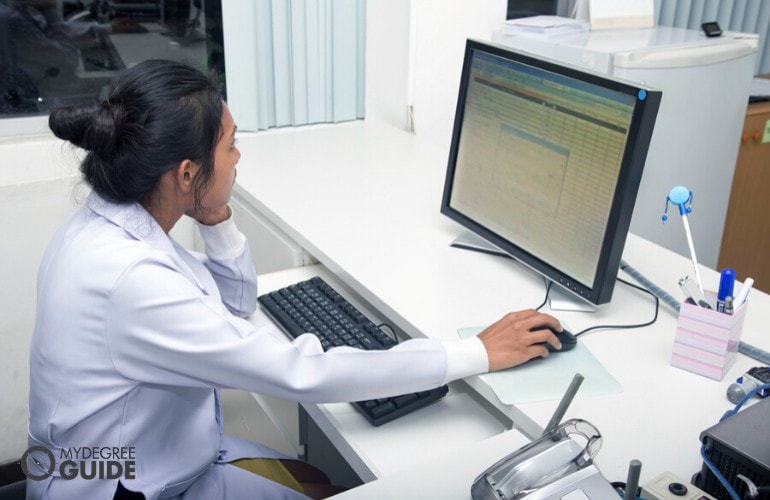Getting a health information management degree online can help prepare you to fill a vital role in today’s healthcare organizations.

Modern medical facilities rely on information stored in electronic records.
Editorial Listing ShortCode:
As a health information management professional, you may learn to manage patient data, analyze it and put your findings to good use.
Health Information Management Degrees Online

A bachelor degree in health information management blends information technology and business management skills while also focusing on the unique needs of the healthcare sector.
Today, healthcare delivery requires the use of electronic health records (EHR). Facilities need trained professionals who can oversee these systems. Health information management (HIM) experts understand how to gather healthcare data, analyze it and get that information into the hands of those who need it.
You may take on those responsibilities after earning a health information management (HIM) degree. It’s an area of study that’s much needed for modern healthcare systems.
You may do well in this field if you have strong computer skills and an analytical mind. In your work, you’ll often need to pay attention to details and also see the bigger picture that they form. It may also be helpful if you’re a good leader who can head up teams and communicate effectively.

You may have some of these abilities already, but your college classes may help develop them. By the time you graduate, you may know how to work with health IT systems and put data to good use.
During your time in college, you’ll take classes on the basic principles of information technology. You’ll explore database structures and how to keep them secure. Other topics in this portion of your curriculum may include data exchange and network architecture.
The curriculum may also cover critical information about today’s healthcare system. You may learn about medical terminology, reimbursement, health law and ethics, human anatomy and pharmacology. There may also be classes on diagnostic and procedural coding.
For this management program, you’ll also study business principles. That may include classes on accounting, finance and analytics. You may also learn about project management, human resources and organizational leadership.

This is a wide variety of classes, so you may learn how these various disciplines interact with one another under the umbrella of health information management. You may even have the opportunity to complete an internship in a healthcare industry setting so you can gain hands-on professional practice experience.
After graduation, you may enter the field as a medical coder or a healthcare information technician. In those roles, you may enter new data, ensure the accuracy of past entries and perform data analysis. These jobs are often found in hospitals and doctor’s offices.
You may also work as a medical services manager. This is an administrative role in which you may oversee the work that goes on in your facility. Your HIM background may help you supervise technology processes and make smart business decisions.
If you’d like to interact with patients regularly, you may work as a patient navigator. In this role, you may refer to electronic records often as you help patients understand their medical needs and figure out their billing concerns.
With professional practice experience, you may become the director or manager of HIM services in your facility. In some cases, this is an executive-level role, and you may get paid accordingly. Experience may also qualify you to offer HIM consulting services to other organizations.
Health Information Management Careers & Salaries

Health information management professionals often work in the business departments of healthcare industry organizations. They perform duties to ensure that health services are administered to patients in organized, efficient and affordable ways. Their work frees up clinicians to focus on diagnosis and treatment.
For example, medical coders take care of entering data into health information systems. This information is used for maintaining accurate records of a patient’s medical history, and coding is also used for billing purposes. Some coders are known as medical records technicians.
Working as a coder is an entry-level job for some HIM graduates. It is sometimes one of the lower-paying roles in this field, but it may eventually lead to a coding management position. That job often commands a much higher salary.
The health information department of a medical facility may take care of a variety of responsibilities in addition to coding. For example, this department may be responsible for ensuring compliance with health regulations, protecting the privacy of patient information and drawing business conclusions from data.

Networking, database development and other technology responsibilities may also be housed here.
After earning your bachelor’s in health information management, you may take an entry-level role in an HIM department. Over time, you may be able to advance to supervisory or management roles. The top position in this department is sometimes that of HIM director or manager.
HIM jobs are often found in hospitals and group physicians’ practices, but other organizations hire these professionals as well. You might work for a nursing home, a university clinic, an outpatient surgical center, a dental facility or anywhere else that people receive medical services.
Editorial Listing ShortCode:
You may also hold HIM roles in organizations that work alongside healthcare providers. For example, drug companies, pharmacies, health insurers and medical supply companies might benefit from the skills you may learn in your bachelor’s degree program.
If you’d rather not work in one particular facility, you may consider a career as an HIM consultant. In that role, you may interact with many different organizations to help them improve their information management practices.
According to the Bureau of Labor Statistics, some careers in the health information management field include:
| Careers | Annual Median Salary |
| Health Information Manager in Hospitals | $112,870 |
| Medical and Health Services Manager | $104,280 |
| General and Operations Manager | $103,650 |
| Clinical Manager | $100,860 |
| Database Administrator | $98,860 |
| Nursing Home Administrator | $89,880 |
| Administrative Services Manager in Healthcare | $87,920 |
| Patient Navigator | $56,500 |
| Cancer Registrar in Hospitals | $46,880 |
| Medical Coder | $44,090 |
These average health information management bachelor degree salary figures are not a guarantee of income and may vary based on your job responsibilities and the area of the country where you live. Your earnings may increase after working in the field for several years or getting a master’s degree in health information management.
The growing reliance on electronic health records and the increasing medical needs of an aging population are leading to job growth in this field. The U.S. Bureau of Labor Statistics predicts an 8% growth rate over the next ten years for medical records and health information technicians.
Choosing a Health Information Management Degree

Do you want to earn your health information bachelor’s degree online or on a college campus? That’s one of the first things to think about when selecting a school for your studies.
In-person classes are the traditional way to earn a degree, but online courses offer a promising alternative for busy schedules and working professionals. With an online degree, you may be able to complete your coursework in the evening, on the weekends or whenever it fits your life.
Another reason to consider online studies is if you’re in a hurry to earn your degree. In that case, look for online degree programs that use an accelerated schedule. You may be able to take year-round classes and earn your degree in less time than the four years needed for most traditional programs.
As promising as online classes are, they aren’t for everyone. For one thing, it’s important that you have access to strong internet service and a dependable computer. Also, it’s a good idea to be a self-starter who is motivated to get work done and organized enough to keep yourself on track.
Whether you opt for on-campus or online classes, it’s a good idea to pay attention to whether a college is accredited. There are two types of accreditation to keep in mind. The first is regional accreditation. That indicates that the college maintains adequate educational standards across all departments.
Editorial Listing ShortCode:
The other is programmatic accreditation, which shows that a particular department or program meets the standards of a particular industry. For healthcare information management programs, this type of accreditation comes from the Commission on Accreditation for Health Informatics and Information Management (CAHIIM).
Earning a CAHIIM-accredited degree is an important step toward earning various industry certifications from the American Health Information Management Association (AHIMA).
Class location and the program’s accreditation status are some of the major factors that may influence your choice of schools, but you may need to consider other characteristics as well. These may include:
- Class size: Do you want the excitement of a big, bustling college, or would you prefer smaller classes, which may offer more personalized attention?
- Cost: How much will a particular school cost you once you factor in cost per credit hour, fees, scholarships and financial aid?
- Curriculum: Does a school’s class list cover topics that intrigue you and that will further your career goals?
- Graduation rate: What percentage of students who begin the program graduate within the next several years?
- Student supports: What sort of tutoring, library resources, student organizations and other support services will be available to you?
As you consider these various characteristics, you may want to pick out several different schools that align with your preferences. The admissions process for some colleges can be quite selective, so it’s smart to apply to several and make the final decision after receiving acceptance letters.
Health Information Management Curriculum & Courses

For a Bachelor of Science in Health Information Management, you’ll take courses about healthcare, information technology and business.
- Data Management: This course will cover not only how to use databases to store and organize healthcare information but also the basics of how to build these systems from the ground up.
- Diagnostic and Procedural Coding: In this class, you’ll learn how to navigate the systems used for medical coding in healthcare records and billing practices.
- Fundamentals of Health Information Management: An introductory class will survey healthcare systems and electronic health records and pave the way for higher-level HIM studies.
- Health Law and Ethics: You’ll study the regulations that control healthcare delivery and reimbursement, including the Health Insurance Portability and Accountability Act (HIPPA), and you’ll discuss what it means to provide ethical services in healthcare industry settings.
- Healthcare Reimbursement: This course will cover health insurance and other systems used for medical payments in the U.S. and discuss how these structures should affect your budgeting decisions.
- Human Resources in Health Organizations: You’ll prepare for management roles by learning about overseeing teams, resolving personnel issues and encouraging quality work.
- Information Technology in Healthcare: A class in medical informatics will prepare you to work with networks and computer systems to collect, store and organize healthcare data.
- Medical Terminology: Understanding terms and acronyms commonly used in medical organizations will help you communicate with doctors, nurses, healthcare administrators, insurance companies and other health professionals.
- Project Management: You’ll learn in this course to oversee HIM projects, such as building a database program or implementing a new information management system.
- Quality Management in Healthcare: The curriculum for this class will teach you to analyze data and use management skills to ensure that your facility is delivering the best possible health services while also keeping budgetary needs in mind.
In addition to these health information management courses, you’ll complete a general education courses core. These will cover topics like composition, college algebra, biology and psychology. Altogether, you’ll need to earn about 120 credit hours before graduating.
Editorial Listing ShortCode:
There may be an opportunity to select some electives. You may be able to earn your elective credits from any department in your college, or you might need to take specific health information management courses.
Not only do electives let you explore topics of interest, but they also allow you to customize your studies so they may better prepare you for your future career goals.
Some schools also offer an internship component toward the end of the coursework. This may give you a chance to try out your new skills under the supervision of a practicing HIM professional. Your online college may help you connect with an internship site in your local area.
Admissions Requirements

Before you can begin classes for your HIM degree, you’ll need to apply to college and get accepted. Each school sets its own admissions policies, but you may need to submit:
- Application: You’ll start by filling out a standard form with contact information and other personal details.
- Fee: Most schools ask you to pay for the privilege of having your application reviewed, but you may be able to forgo this cost if financial need made you eligible for an SAT fee waiver.
- Standardized test scores: Many colleges want to see your ACT or SAT scores so they can determine whether you have the foundational knowledge needed for success in their classes.
- Transcripts: Before beginning a bachelor’s degree program, you’ll need a high-school-level education, and your school transcripts provide proof of your coursework and your GPA.
In addition, you may need to turn in other materials that showcase your strengths and abilities. Many schools ask applicants to answer essay questions about their academic or career plans. You may also need to provide references who can write letters about your potential.
Some schools interview applicants before deciding whether to admit them. In an interview, the school may learn more about you, and you may learn more about the school.
Pay close attention to application deadlines. Promptness may boost your chances of being admitted to a program.
Accreditation

You are probably enrolling in college because you want to get a quality education. To ensure that the diploma that you earn will be backed by meaningful knowledge, attend a regionally accredited college.
Holding regional accreditation means that a school has proven itself to educate students well. It also means that the institution is accountable to a higher authority. An accredited diploma is usually respected by both employers and graduate programs, so it’s quite important to know your program’s accreditation status.
In the U.S., there are seven regional accreditors, such as the Middle States Commission on Higher Education (MSCHE). They are approved by the Council for Higher Education Accreditation (CHEA).
Health Information Management Accreditation

Becoming certified as a Registered Health Information Management Administrator (RHIA) may increase your eligibility for a number of positions in this field. This credential may also help you negotiate a higher salary.
Not just anyone can become an RHIA. Before taking the credentialing examination, you must, in most cases, complete a curriculum that’s accredited by the Commission on Accreditation for Health Informatics and Information Management Education (CAHIIM).
This organization provides programmatic accreditation for health information management degrees.
Editorial Listing ShortCode:
To receive accreditation from CAHIIM, a program must show that its HIM program curriculum aligns with standards set by the American Health Information Management Association (AHIMA). This organization not only establishes educational standards for this industry, but it also administers the RHIA credential.
Even if you have no intention of becoming certified as an RHIA, it may be a good idea to choose a CAHIIM-accredited program for your bachelor’s in health information management. Accredited schools receive this distinction because they provide the education that students need for the modern healthcare workforce.
Attending an accredited program may provide you the assurance that you’re learning up-to-date information that will make a difference in your professional endeavors.
Health Information Management Professional Organizations

You can learn more about what it’s like to work as an HIM professional by joining an industry organization. These groups bring together people who carry out information management tasks in various health-related settings to share ideas and information. Members network with one another and can access group resources.
- American Association of Healthcare Administrative Management (AAHAM): Focused on professionals who deal with the revenue cycle in healthcare-related organizations, AAHAM welcomes members who work in clinical settings as well as those in support organizations, including billing companies and software providers.
- American College of Healthcare Executives (ACHE): Committed to the unique role of healthcare executives, including those who lead in the information management area, ACHE provides support for health leaders and encourages research and academics to further this field.
- American Health Information Management Association (AHIMA): As a leading organization in the health information field, AHIMA maintains industry standards, contributes to textbooks and other influential publications, administers credentialing programs, and brings together professionals for networking and professional growth.
- Healthcare Financial Management Association (HFMA): For those whose healthcare information management career deals heavily with issues of finance, HFMA membership may be a valuable way to stay in touch with industry standards and network with others in the healthcare finance sector.
- National Association of Healthcare Access Management (NAHAM): By focusing on patient access professionals, NAHAM is able to provide tailored support and credentials for people whose jobs involve billing, registration, scheduling and other related responsibilities.
Most professional organizations welcome student members, and many have special rates for those in school. Remaining a member throughout your career may help you continue to grow and develop for years to come, and you may also receive opportunities to mentor younger HIM program professionals.
Being in an industry organization may contribute to your professional development. As you attend conferences, read magazine articles, chat in online groups and listen to webinars, you might gain new ideas that you may be able to apply in your work setting.
Because of your membership, you may also benefit from discounts for personal or professional use.
Health Information Management Licensing and Certification

You may increase your salary potential and prove your know-how by pursuing industry certifications. Taking select classes and then passing a credentialing test may allow you to advertise yourself as a certified professional.
Some of the healthcare information management industry’s top credentials are issued by AHIMA.
- Registered Health Information Management Administrator (RHIA): If you have your sights set on a management role that deals with analytics, regulatory compliance and data protection, then RHIA certification may be a good choice for you.
- Registered Health Information Technician (RHIT): You may want to pursue RHIT certification if your work involves coding, data entry, and computer-based organization and analysis of patient information.
You’ll need to complete a CAHIIM-accredited college program before you can sit for these AHIMA certification tests. RHIA certification requires a CAHIIM-accredited bachelor’s degree, but you will need only an associate degree from a CAHIIM-approved school to take the RHIT test.
Editorial Listing ShortCode:
Requiring half as many college credits, it’s generally quicker to earn RHIT certification than to become an RHIA. On the other hand, the more rigorous prerequisites for RHIA credentialing means that it may be more effective at helping you stand out among a pool of job applicants.
Financial Aid & Scholarships

Many students rely on financial assistance to help them afford the cost of a baccalaureate degree, and you might need to do likewise.
The first step to applying for tuition help is to complete the Free Application for Federal Student Aid (FAFSA). You’ll enter personal information and data about your financial situation. These details will be used to calculate how much government assistance you can receive.
If your need is great enough, you may qualify for a grant. Federal Pell Grants are a common example. You won’t have to repay grant money after finishing college.
You may also be able to borrow money from the federal government to help cover your tuition costs. Loans must be repaid, and they’ll accumulate interest too.

You may be able to supplement your federal aid with similar programs from your state. The state may use your FAFSA details to determine what you can receive.
Scholarships can be another valuable source of school funds. Some scholarships may be available directly from your college. Others may be administered by philanthropic groups, local clubs or industry organizations.
Scholarships may be worth anywhere from a few hundred dollars to several thousand. Some are one-time-only gifts, and others may be renewed for each year of your studies.
There’s an application process for most scholarships, and only a handful of winners are selected. Submitting thoughtful applications that highlight your strengths and interests may help you secure one or more awards.
What is a Health Information Management Degree?

Health information management is a field that includes aspects of healthcare delivery, business decision-making and information technology. People who work in this area collect and manage data for health-related organizations.
Maintaining privacy and following federal regulations are important aspects of healthcare data management. Professionals in this field also enter patient information, compile analyses and push for quality healthcare delivery.
When you study for a baccalaureate degree in health information management, you’ll learn about medical terminology and healthcare reimbursement. You’ll also study database operations, computer systems, medical coding, human resources, health law and project management.
Is a Health Information Management Degree Worth It?

You don’t have to become a doctor or a nurse to make a difference in people’s health. To function smoothly, healthcare organizations need many different employees. You may contribute to patient wellness through your knowledge of health information management.
Editorial Listing ShortCode:
Knowing that you are making a difference in people’s health might make HIM a satisfying career path. Because of your work, healthcare costs may go down, and quality may go up. This field may also offer many job opportunities. The U.S. Bureau of Labor Statistics estimates that jobs for health records technicians are currently increasing at a rate of about 8%. Overall, employment in the healthcare sector is projected to grow 15% for the next ten years, much faster than the average for all occupations.
What Can You Do With a Health Information Management Degree?

HIM professionals fill non-clinical roles in healthcare organizations, such as hospitals and physician’s offices. They may also work in nursing homes, health departments, dental offices, surgical centers and university clinics.
In one of those places, you might be a medical coder, a billing specialist or a records technician. You may also hold an administrative role in which you supervise office staff and operations. As a manager or director of HIM, you might be responsible for overseeing all data-related functions in a medical facility.
With an HIM degree, you may also work for an employer that provides medical support services. That might include pharmacies or health insurers.
Is Health Information Management a Good Career?

Health information management is a promising field because you may enter with only an associate or bachelor’s degree, but there is plenty of room for advancement. If you want to increase your earning potential, you may add certifications to your resume or go back to school for master’s degree in HIM.
If you’re computer-minded and detail-oriented, this field may give you the chance to put your skills to good use. The work that you do may improve patient care and hospital efficiency.
There are many different jobs to be had with an HIM degree. For example, you may take care of billing, records management or data analysis.
What is Health Informatics?

Electronic healthcare data management plays an increasing role in the healthcare system. The field that deals with gathering, managing and applying that data is known as health informatics.
Because of the work of informatics professionals, electronic health records are accessible to medical providers. For example, informatics may allow your primary physician, your specialist doctor and your health insurance company to view your treatment history.
What you can do with a health information technology degree and a health informatics bachelor degree is almost identical as they both share very common concepts. In general, though, health IT focuses on implementing and maintaining technology systems. Informatics then focuses on building upon that by actually gathering data and putting it to good use.
How Long Does It Take to Get a Degree in Health Information Technology?

A bachelor’s degree is commonly considered a four-year degree, and if you go to school on campus, that’s probably about how long it will take. Online degrees are often faster, though. Some programs let you move at your own pace. Others may give credit for prior knowledge or offer year-round classes.
If you enroll in an online program for your bachelor degree in health information management or technology, you may be able to shave at least a year off of your schooling. Some online colleges claim that full-time students may complete all graduation requirements in three years or less.
Are There Any Affordable Bachelors in Health Information Management Online?

The cost of an online health information management program is often between $300 and $600 per credit hour. Unless you have transfer credits, you’ll probably need to earn around 120 credits.
Some schools rely on a quarter-credit system. In that case, the cost per credit may be lower, but you’ll need more of them to graduate. It’s a good idea to do the math carefully before selecting a school based on cost.
Editorial Listing ShortCode:
Fees are another factor to consider. Some colleges charge a per-class or per-semester technology fee. Be sure to calculate that amount into your cost comparisons.
What is RHIA Certification?

To enhance your career in health information management, you may want to consider becoming credentialed as a Registered Health Information Administrator. This certification is issued by AHIMA.
To earn it, you have to graduate from a baccalaureate degree program that has been accredited by CAHIIM. Passing a credentialing exam is also required.
The RHIA program is for people who want to perform management roles related to health data. The responsibilities in these jobs may include protecting privacy and security, performing data analyses, complying with regulations, and providing departmental oversight.
Holding this certification may qualify you to become a medical or health services manager.
What is RHIT Certification?

If you have your sights set on a technical career that involves a lot of data work, then getting certified as a Registered Health Information Technician might be right for you. Like RHIA certification, RHIT credentials are administered by AHIMA.
You’ll need to earn an associate degree before you can take the RHIT examination. The degree must be from a CAHIIM-accredited program.
RHIT professionals often do a lot of work with computers and medical coding. They may input data and analyze it. Job titles may include cancer registrar, medical coder, coding auditor, data analyst and medical information technician.
Which Health Information Management Certification Should I Choose – RHIA or RHIT?

When considering which type of certification to pursue, think about your career goals. If you want to perform technical jobs related to computers, software and data, then the RHIT track may be the right one for you.
If you want to hold managerial or administrative positions and have your sights set on someday becoming an HIM director, then you may want to choose the RHIA option.
Because RHIT certification requires less education, you may want to start with it. That credential may serve as a good foundation for future career growth. Later, obtaining RHIA certification may help you move into managerial roles.
What Career Opportunities Are There With a Bachelor’s in Health Information Management?

After graduating with a bachelor’s degree in this field, you may look for work as a medical coder, a billing specialist, a records auditor or a cancer registrar. You may also be qualified to supervise a team of personnel in a medical office or a hospital department.
Certification programs may increase your career options. As a certified RHIA, you may advance to supervisory roles, such as health information management manager.
HIM professionals may work in a variety of health-related organizations. Many jobs are found in hospitals, but private offices, residential facilities, pharmaceutical companies, insurers and other organizations need these services as well.
What is the Difference Between Health Information Management and Healthcare Administration?

HIM is a specialized field that focuses on data. It addresses ways that health data is collected, entered, stored, organized and retrieved. If you work in this field, you may also perform analyses to draw meaning from data sets.
Healthcare administration could be thought of as a broader discipline with a strong emphasis on business principles. This degree program may help prepare you to oversee personnel or departments in healthcare settings.
Editorial Listing ShortCode:
While your position might involve health data or technology teams, it may also qualify you to supervise other departments, such as finance, facilities or human resources.
Is Health Information Management In Demand By Employers?

Electronic health records have become the standard for information management in healthcare settings. As a result, facilities need trained specialists who know how to handle these records.
Also, the need for healthcare services is growing around the U.S. The more often that people go to the doctor and have procedures performed, the more records there are to enter and organize.
As a result, you can expect continued job growth in this area. According to the U.S. Bureau of Labor Statistics, positions for health information technicians are growing at an 8% rate, and jobs for medical services managers are increasing at a 32% rate.
How Much Can You Make With a Health Information Management Degree?

The average health information management bachelor degree salary ranges from $44,090 to $112,870 per year (Bureau of Labor Statistics). Of course, you may start with a lower salary and work your way up.
For example, medical coder is a position you might be able to get toward the beginning of your HIM career. A medical coder makes about $44,090 annually.
Someday, you might become a health information manager. An experienced manager may earn as high as $195,630 each year. Professional practice experience can contribute to salary increases. Certifications and graduate degrees may lead to raises as well.
Healthcare Management vs. Health Information Management – What’s the Difference?

Healthcare management is a degree you may want to pursue if you’re interested in carrying out business responsibilities in a medical setting. This field addresses healthcare leadership, and you’ll study topics like finance, accounting, marketing, organizational structure and human resources.
You’ll probably have some classes on information technology, but it won’t be the main focus of your studies.
The health information management field revolves around data — collecting it, keeping it secure and organized, and using it to inform future decisions. If you’re committed to providing better health services through clear, accurate, informative data, then this may be the degree path for you.
Universities Offering Online Bachelor’s Degree Programs in Health Information Management
Methodology: The following school list is in alphabetical order. To be included, a college or university must be regionally accredited and offer degree programs online or in a hybrid format.

Minneapolis-based Capella University offers 52 degree programs. The school’s enrollment of 38,000 represents students from all 50 states. Bachelor’s, master’s, and doctoral degrees are offered. Capella was established in 1993. It is known for its flexible and online degree programs.
- BS in Health Care Administration – Health Information Management
Capella University is accredited by the Higher Learning Commission.

Charter Oak State College is a public liberal arts college located in New Britain, Connecticut, with an enrollment of 2,330. Established in 1973, the schools offers a variety of associate’s, bachelor’s, and master’s degrees.
Charter Oak is a member of the Connecticut State Colleges and Universities System. Students can take advantage of online, nontraditional options for completing their degrees.
- Bachelor’s in Health Information Management
Charter Oak State College is accredited by the New England Commission of Higher Education.

Established in 1866, Davenport University is a private institution offering associate’s, bachelor’s, and master’s degrees. The school’s main campus is located in Grand Rapids, MI. Current enrollment at Davenport is 7,232. Davenport University students can choose from more than 50 areas of study throughout five colleges.
- BS in Health Information Management
Davenport University is accredited by the Higher Learning Commission.

DeVry University is a private learning institution founded in 1931. Enrollment stands at 17,364 students for this school based in Naperville, Illinois. Degree programs at the associate’s, bachelor’s, and master’s levels covering a variety of fields are available across DeVry’s five colleges.
- Bachelor’s in Health Information Management
DeVry University is accredited by The Higher Learning Commission.

East Carolina University is a public research university located in Greenville, North Carolina. Founded in 1907, ECU boasts a current enrollment of 29,131. Students can choose from undergraduate, master’s, specialist, and doctoral programs focused on majors and concentrations in liberal arts and the sciences.
- BS in Health Information Management
East Carolina University is accredited by the Southern Association of Colleges and Schools Commission on Colleges.

Ferris State University is a public research university established in 1884. The school’s main campus is located in Big Rapids, Michigan. The school’s student body of 14,707 can choose to pursue dozens of majors and specialties across a variety of bachelor’s, master’s, and doctoral programs.
Ferris is known for a robust honors program that includes students from nearly every major.
- Bachelor’s in Health Information Management
Ferris State University is accredited by Higher Learning Commission.

Franklin University was founded in 1902 to serve the needs of adult learners. Today, the majority of Franklin students study online. Students from more than 72 countries study at the university. Students can pursue degrees at the associate’s, bachelor’s, master’s, and doctorate levels. Franklin University is based in Columbus, Ohio.
- BS in Health Information Management
Franklin University is regionally accredited by the Higher Learning Commission.

Grand Canyon University is a Christian university based in Phoenix, Arizona. Students can study bachelor’s, master’s, and doctoral programs covering a variety of liberal arts and science majors. Founded in 1949, GCU now boasts more than 101,500 enrolled students. It is one of the largest Christian universities on the globe in terms of study body.
- BS in Health Information Management
Grand Canyon University is accredited by the Higher Learning Commission.

Milwaukee’s Herzing University is a private university offering associate’s, bachelor’s, and master’s degrees in more then 30 programs. A big emphasis is placed on career-focused, convenient learning options. Established in 1965, Herzing currently offers flexible degree paths and learning options for students.
- BS in Health Information Management
Herzing University is accredited by the Higher Learning Commission.

Founded in 1820, Indiana University consists of Indiana University Bloomington (IU Bloomington) and Purdue University Indianapolis (IUPUI). The institution’s flagship campus is located in Bloomington, Indiana.
Total university-wide enrollment stands at 110,436. Students can pursue bachelor’s, master’s, and doctoral programs in virtually all areas of study.
- BS in Health Information Administration
- BS in Health Information Management
Indiana University is accredited by The Higher Learning Commission.

Louisiana Tech University is a member of the University of Louisiana System that was established in 1894. The university has nearly 12,000 students enrolled today. Louisiana Tech’s campus is located in Ruston, Louisiana.
The school conducts research in collaboration with major agencies like National Aeronautics and Space Administration (NASA), the National Institutes of Health (NIH), the National Science Foundation (NSF), the Department of Defense (DoD), and the Federal Aviation Administration (FAA).
Students can pursue bachelor’s, master’s, and doctorate degrees.
- BS in Health Informatics and Information Management
Louisiana Tech University is accredited by the Southern Association of Colleges and Schools Commission on Colleges.

Missouri Western State University is a public university located Saint Joseph, Missouri. Known for its majestic griffin mascot, Missouri Western has a student enrollment hovering near 5,500. Established in 1915, the school offers dozens of undergraduate and graduate programs in the arts and sciences.
- BS in Health Information Management
Missouri Western State University is accredited by the Higher Learning Commission.

Parker University in Dallas, Texas, is a private school with a reputation for focusing on healthcare and health-science studies. A small enrollment of 977 students allows the school to offer personalized, focused educational options.
The school’s mission revolves around creating healthcare professionals and leaders who are are ambitious, compassionate, and enthusiastic about their fields. Parker University was established in 1982.
- BS in Health Information Management
Parker University is accredited by the Southern Association of Colleges and Schools Commission on Colleges.

Purdue University is an esteemed public research university located in West Lafayette, Indiana. The university offers more than 200 undergraduate majors. In addition, students can choose from more than 69 options for master’s and doctoral programs. Purdue was established in 1869. The school’s enrollment stands at 43,411.
- BS in Health Information Management
Purdue University is accredited by the Higher Learning Commission of the North Central Association of Colleges and Schools.

Rutgers University is an American public research university located in New Brunswick, New Jersey. RU makes more than 75 academic departments available to its more then 68,000 students. The school has a faculty of 9,000 instructors. Bachelor’s, master’s, and doctoral programs are available in a wide variety of majors and concentrations.
- BS in Health Information Management
Rutgers is accredited by the Middle States Commission on Higher Education.

Saint Joseph’s College of Maine is a private Catholic liberal arts college that was founded by the Sisters of Mercy in 1912. It stands today as Maine’s only Catholic college. This college in Standish, Maine, currently offers online programs to 2,400 students spread across 50 states and nine countries.
More than 40 majors, minors, and partnership programs are available for students pursuing bachelor’s and master’s degrees.
- BS in Health Information Management
Saint Joseph’s College is accredited by the New England Commission of Higher Education.

Located between Manchester and Hooksett, Southern New Hampshire University is a private university with an enrollment number topping 90,000. The school was founded in 1932. SNHU utilizes a unique open-enrollment policy for applicants. Students can choose from a variety of bachelor’s, master’s, and doctoral options.
- BS in Health Information Management
Southern New Hampshire University is accredited by the New England Commission of Higher Education, Inc.

Texas State University is a public research university located in San Marcos, Texas. Established in 1903, the school currently has an enrollment of 38,231 students. Texas State has 10 colleges and 50 departments that students can select when pursuing bachelor’s, master’s, and doctoral degree programs.
The school is home to the world’s largest forensics research facility.
- BS in Health Information Management
Texas State University is accredited by the Commission on Colleges of the Southern Association of Colleges and Schools.

The University of Central Florida is a public research university in Orange County, Florida, with an enrollment of 69,525. The school was founded in 1963. It is famed for its association with NASA and Florida’s Space Coast. Students from all 50 states and 157 countries pursue bachelor’s, master’s, and doctorate programs at UCF.
- BS in Health Informatics and Information Management
The University of Central Florida is accredited by the Southern Association of Colleges and Schools Commission on Colleges.

Founded in 1819, the University of Cincinnati is a public research university that stands as Cincinnati’s oldest institution of higher learning. Annual enrollment stands at just above 44,000 students. UC offers bachelor’s, master’s, and doctoral degree paths.
The University of Cincinnati is notably the originator of the co-operative education model that is now widely used.
- BS in Health Information Management
The University of Cincinnati is accredited by the Higher Learning Commission.

With an enrollment of more than 33,000 students across 16 colleges, the University of Illinois at Chicago (UIC) is the largest university in the Chicago area. The university was established in 1982 as a center for learning and research.
UIC is the major public medical center for the state of Illinois. Students can pursue bachelor’s, master’s, and doctoral degrees.
- BS in Health Information Management
The University of Illinois at Chicago is accredited by the Higher Learning Commission.

The University of Wisconsin allows students the opportunity to earn an undergraduate or graduate degree in various academic fields. This public school understands the need for flexibility in adult learning and offers both online and traditional learning Platforms.
UWW offers students Hands-on learning opportunities through numerous research study prospects.
- BS in Health Information Management and Technology
The University of Wisconsin is accredited by the Higher Learning Commission.

Weber State University is a public university located in Ogden, Utah, that was founded in 1889. It currently offers bachelor’s, master’s, and doctoral programs for its more than 26,681 students. More than 250 certificate and degree programs are offered throughout seven colleges at Weber State.
The school boasts a prominent alumni list that includes the president of Black & Decker and a former U.S. Secretary of the Treasury.
- BS in Health Information Management
Weber State is regionally accredited through the Northwest Commission on Colleges and Universities.

Western Governors University is a private, fully online university based in Salt Lake City, Utah. Founded in 1997, WGU is famed for using a unique competency-based learning model. The school boasts an enrollment of 119,618. Students can pursue bachelor’s and master’s degrees in targeted, specialized areas of study.
- BS in Health Information Management
Western Governors University is accredited by the Northwest Commission on Colleges and Universities.

Western Kentucky University is public university located Bowling Green, Kentucky, that was founded in 1906. WKU’s 20,277 enrolled students can pursue bachelor’s, master’s, and doctoral degrees for dozens of majors and areas of focus. In 2007, the WKU Honors College became the state of Kentucky’s first college of its kind.
- BS in Health Information Management
Western Kentucky University is accredited by the Southern Association of Colleges and Schools Commission on Colleges.
Getting Your Health Information Management Degree Online

A bachelors in health information management is a degree with a great deal of potential. One door it may open for you is the opportunity to become a certified RHIA professional. This career path may also include reliable pay, advancement potential and frequent opportunities to make a difference in others’ wellbeing.
Online degree programs may be the best way to get your start in this field. You may be able to complete classes on your schedule while also keeping up with the rest of your responsibilities.
You may take the first step toward a new career by submitting applications to accredited health information management programs.

